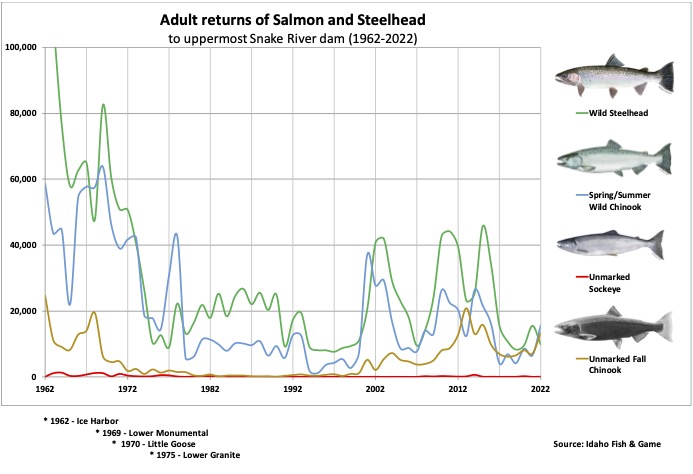forum
library
tutorial
contact

Ag Stakeholders: Mediation
Skewed Toward Breaching Dams
by Matthew Weaver
Capital Press, May 26, 2023
|
the film forum library tutorial contact |

|
Ag Stakeholders: Mediation
by Matthew Weaver
|
One speaker proposed constructing an entirely separate channel
for fish migration that would bypass all four dams.
 Representatives of agriculture, electric utilities and port districts were vastly outnumbered May 25 but came out swinging during the third and final public listening session on breaching the four lower Snake River dams.
Representatives of agriculture, electric utilities and port districts were vastly outnumbered May 25 but came out swinging during the third and final public listening session on breaching the four lower Snake River dams.
About 38 people spoke in favor of dam breaching, and 17 spoke against breaching.
"... A single point of view, pro-breaching, has dominated these listening sessions and I suspect is the predetermined outcome of the closed-door mediation discussions," said Sarah Highfield, communications director for the Port of Whitman County in Colfax, Wash.
A lawsuit filed by the National Wildlife Federation and a coalition of environmental groups and tribes has been stayed through Aug. 31 while mediation led by the White House Council on Environmental Quality takes place.
Highfield pointed to the first question in the CEQ's request for information: What constitutes “restoration” of the lower Snake River and what steps should the federal government take to restore the lower Snake River?
"This leading question presupposes that breaching the four lower Snake River dams is the only acceptable next step for the federal government," she said.
Breaching is "neither warranted to recover (Endangered Species Act)-listed salmon species nor compatible with the many authorized purposes of the Columbia-Snake river system for hydropower, navigation, flood control, irrigation and recreation," Highfield said.
George Caan, executive director of the Washington Public Utility Districts Association, said the mediation is apparently designed to circumvent existing legal processes in an effort to promote dam removal.
"These dams should not be breached, destroyed or replaced -- they are vital to our state's economy and the reliability of our electrical grid," Caan said.
Without the dams, the region would be in jeopardy of not meeting the demand for electricity on the hottest and coldest days, he said.
"While information regarding the mediation has been severely limited, removal of the four lower Snake River dams has clearly become a focal point," said Alex McGregor, chairman of the McGregor Co., which provides fertilizer, crop consulting and research to farmers.
It's "vital" to not look for solitary solutions, but instead take a holistic approach, McGregor said.
"There's so much to be done, and the rationale for draconian action -- removing the dams -- is murky at best," he said.
One speaker, Michael Jennings, proposed constructing an entirely separate channel for fish migration that would bypass all four dams.
Agricultural stakeholders argue that proponents of dam breaching oversimplify the situation.
"To summarize: Salmon good, orca good, lower Snake River dams bad because they are causing the Snake River salmon to go extinct," David Van Cleve said in favor of dam breaching during the session.
For every 100 young chinook and steelhead that head downstream and past the four dams every spring, about 75 survive, Ritchie Graves, Columbia Hydropower Branch chief for the National Oceanic and Atmospheric Administration, told the Capital Press recently. For adult fish swimming upstream, the survival rate is above 90%.
Ryan Redmond, board member for the Washington Rural Electric Cooperative Association, said he wrote a paper in college about breaching the dams.
"The paper was well-written, well-intentioned and like most of the information that I'm hearing here today, entirely misinformed and false," Redmond said. "...We need to assure that these dams stay in place until better technologies that are true and proven are available."
Highfield, of the Port of Whitman County, said the federal government's legal objective should be the recovery of salmon populations and not some form of Snake River restoration, commonly linked to breaching dams in discussions.
The council's request for information will remain open until Aug. 31, but written comments are encouraged to be submitted by July 3, said Matt Philibeck, of the Federal Mediation and Conciliation Service.
learn more on topics covered in the film
see the video
read the script
learn the songs
discussion forum
